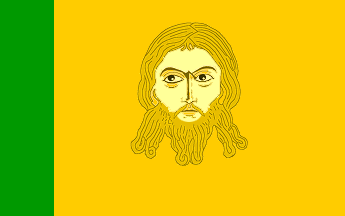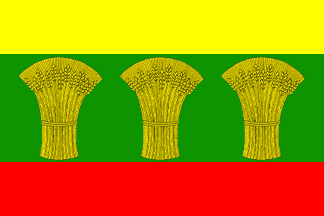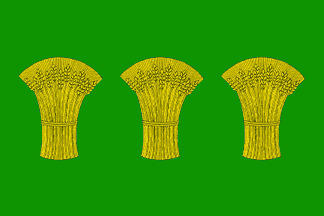
Last modified: 2006-07-29 by antonio martins
Keywords: penza | face | jesus | veronica | icon | ivan 1 (russia) | kulikovo | golden horde | nerukotvornĭ |
Links: FOTW homepage |
search |
disclaimer and copyright |
write us |
mirrors

(Note: You need an Unicode-aware software and font to correctely view the cyrillic text on this page. See here transliteration details).
The flag proposal was introduced by chairman Victor Lazutkin. The flag is
rectangular with one vertical and one horizontal of the stripes: vertical is
green (grassy) color, horizontal is yellow (golden) of colors. In the center
of flag the symbolic image of Saviour Nerukotvorny is located. As it
is explained in the project, green color symbolizes nature of region, its
forests, and also fertility, eternal life and health. Yellow symbolizes fields,
wisdom, knowledge, light, abundant crops, prospect. The symbolic image of
Saviour Nerukotvorny symbolizes spirituality, unity, national revival.
Under such banners with Saviour Nerukotvorny’s image Russian troops
struggled in Kulikovo field, in the Crimea and in Livonia, and Yermak under
this flag mastered Siberia. Arrangement on the flag of the symbolic means of
Saviour developers connect also with the nationwide status of the christian
holidays noted in Penza region — honey, apple and bread Saviours, who
fall at the end of the summer.
Mark Sensen, 17 Nov 2002, translating from
58region.ru
It is almost an exact replica of the icon which used to adorn the
Church of Spas. The exact details of the flag remain to be worked out.
A prototype is on public view in a Penza museum.
Phil Nelson, 09 Jan 2003, quoting from
DeSoto Times
The design includes an unmistakable soviet element — the
vertical bar at the hoist, also used in
many other Russian subnational flags.
António Martins, 12 Jan 2003
At 58region.Ru there is a
photo of the flag and when you click on it you see a bigger photo of it. You
can also click on the text under the flag in the upper left corner, there is
an explanation (all in russian) about the flag. If I’m correct than the ratio
is 5:8.
Mello Luchtenberg, 17 Nov 2002
For some reason the proposal is to center the face on the flag, not on
the golden field.
The website 58region.RU
says that this flag is only a proposal, to be considered by the Legislative
Assembly during its current session. But the heraldry site
Geraldika.RU,
gives the date of adoption as 15 November 2002, two days after the opening
of the session.
John Ayer, 18 Nov 2002
The head represent the Holy Face and the banner with this head was shown
in the war of Kulikovo Pole in 1380. It is black or purple, historians don’t
agree on the color.
Arnaud Leroy, 18 Nov 2002
The icon on which this image is based is from the late XII-early XIII
centuries, and is preserved in the Tretyakov Gallery (Moscow).
"Нерукотворный"
means "not made by hands", that is, a miraculous image, like that of the
Virgin of Guadalupe. Such images enjoy great
prestige in the Russian Orthodox Church, as I understand.
John Ayer, 18 Nov 2002
Having tried to learn something about Orthodox iconography a few years back,
I believe that any given "Нерукотворный"
icon is not necessarily "not made by hands" but that the original pattern of
the icon — in Latin the "vera icon" which is of course an anagram of
"Veronica" [as in St. Veronica, who is said to have weapt Jesus’ face in the
Via Sacra; the towel was miraculously imprinted with the Saviour’s
likeness] — was not made by hands. So in this case, at least, the fact that
there are many such icons is not absurd on the face of it (no pun intended).
Joe McMillan, 19 Nov 2002
In 1380 the realm of the Golden Horde was
threatened by internal strife between throne pretenders. One of them was Mamai,
who was met by a host of Muscovy warriors, led by Prince Dmitrii Ivanovich.
After a fierce battle (not war) the Muscovites prevailed on the field of
Kulikovo — Куликово
Поле, now in the southeast of
Tula oblast, Russia. The victory gained
Dmitrii the epithet "Donskoi", "of the Don". Actually it seems that
the place is not exactly known: Mamai and Dmitrii met «beyond the Don River»
(Задонщина, title
of a famous epic.)
Jarig Bakker, 18 Nov 2002,
quoting
Charles J. Halperin (1985): Russia and the Golden Horde
According to the legend, Ivan the Terrible
stopped in Penza on a journey through central Russia and promised to present
an icon of Jesus on his way back. Although Ivan took a different route back,
one of his aides presented the promised icon to the locals
John Ayer, 12 Dec 2002, translating from
The
Moscow Times
The face of Christ is a symbolic void. Want to go christian on the
flag? Put a cross on it, for crying out loud!
Jorge Candeias, 13 Jan 2003
.gif)
The traditional Penza coat of arms is completely unrelated to the
flag.
António Martins, 21 Jan 2003
It is vert, three bundles of wheat Or on a ground of the first.
Blue colour for the back ground is a common mistake.
Victor Lomantsov, 21 Jan 2003

At Regnum.RU
there’s a text about the adoption of the flag of Penza oblast.
Nothing is official but the version of 3 horizontal stripes of
yellow, green and red (the green stripe being larger than the 2
others) with the 3 garbs from the arms on the
green stripe seems to have good chances to be adopted.
Pascal Gross, 07 Oct 2002

Another variant [mentioned at
Regnum.RU]
would be a green flag with the 3 garbs in the center.
Pascal Gross, 07 Oct 2002
This one is therefore a banner of the arms.
António Martins, 24 Jan 2003
Anything below this line was not added by the editor of this page.